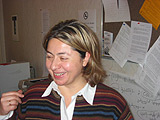:: Interviw with Nino Makhashvili

I look forward to the time when my current activity will not be needed and no one is a victim of torture.
When was the Psychosocial and Medical Rehabilitation Centre for Victims of Torture established, and what are the main priorities of your work?
- The Rehabilitation Centre for Victims of Torture was founded in 2000. The main priorities of our work are rehabilitating victims of torture and promoting the prevention of torture in
What are your target groups?
- Our target groups are:
o Internally displaced persons (from the Abkhazia and Tskhinvali regions) and refugees from
o People who have been tortured in prisons and police stations
o Former political prisoners (the number of which has fortunately decreased recently), mostly supporters of Zviad Gamsakurdia, who have suffered terrible torture from our law enforcement bodies
We provide these people with medical services and medicine, and encourage them with supportive talks.
You have mentioned you have been working on these issues for several years already. What are the trends after these years? Are there any positive changes observable now as compared to recent years and what has been changed?
- The system has not been changed. It can be said that today the situation is even worse. One significant change is that a few years ago the new Ministry of Justice opened the doors for non-governmental sector and we managed to get into penitentiary facilities. Though qualitative changes have not been made, the structure did become more transparent. The good will of the government should also be mentioned, which was revealed in the plan to fight torture on
Can you please tell us briefly about some common forms of torture?
- There are a number of common methods of torture. It is very difficult to find the most traumatized people. They are often overcome with humiliation and live away from the general public. Among the most frequent methods used during the war were:
o Rape, from little children and to old women
o Physical threats
o Cutting parts of body
- In pre-trial isolation, common methods of torture are:
o Electric shock
o Suffocations
o Making people to eat salt and not to give them water
o Falaka (hitting on the heals)
o Hanging people by their feet.
Often a person is tortured in such a way that the traces of torture cannot be discovered but the person is permanently disabled.
Have there been cases of perpetrators being punished?
- During our last 3 years of work, no perpetrators have been punished, although their names and living places are known. This impunity from prosecution occurs all too frequently in our country. Tortured people applying to our centre are offered respectful assistance, but refuse to take legal proceedings, because they are terrified of repercussions from the police.
Where and when can the citizens address you?
- The address of the center is:
- Web Site: http://gcrt.gol.ge/
The organization is funded by the European Union, the United Nations Voluntary Trust Fund for Victims of Torture, and the UN High Commiserate for Refugees (UNHCR).



